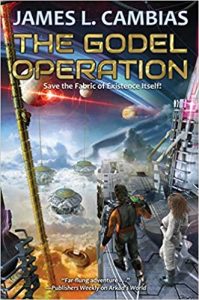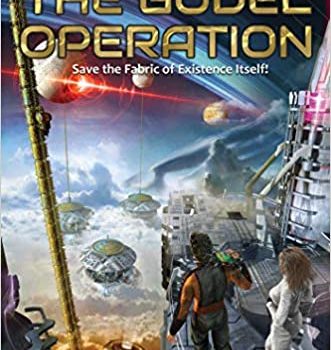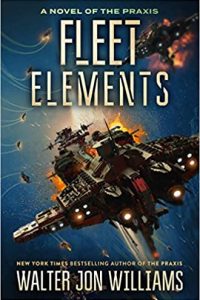Paul Di Filippo Reviews The Godel Operation by James L. Cambias
 The Godel Operation, James L. Cambias (Baen 978-1982125561, 288pp, $16.00, tp) May 2021.
The Godel Operation, James L. Cambias (Baen 978-1982125561, 288pp, $16.00, tp) May 2021.
Readers of a certain vintage might recall that before the term “cyberpunk” crystallized and assumed critical dominance, there were proposals to call the cutting-edge SF of the 1980s “Radical Hard SF.” I’d like to now propose that we invent or recognize a sub-genre called “Radical Fun SF,” and that we put James Cambias at the top of the roster. Radical Fun SF would utilize the entire sophisticated toolkit of science fiction from Gernsback to Rajaniemi, as well as deploying solid speculative science, to craft stories whose dominant mode was sense-of-wonder thrills. No tendentious preaching, no unmixed doom and gloom, no overdose of mundanity. (These prohibitions would not preclude addressing real tragedy, mortality, or critical issues of culture and environment.) Fully “adult,” yet not jaded, Radical Fun SF would seek to evoke the same reactions one had at age 13 when encountering for the first time the very notion of science fiction and the explosion of awe-filled cosmic consciousness it can engender—with perhaps a more “mature” awareness of the complexity of life.
Current examples might be found in James Patrick Kelly’s King of the Dogs, Queen of the Cats; Alastair Reynold’s Revenger series; Michael Swanwick’s Darger & Surplus cycle; everything Rudy Rucker has ever written; and, alas, only a handful of other works. Maybe Jack Vance could be the sub-genre’s patron saint.
No wise person would insist that Radical Fun SF be the only type of science fiction published. But it sure would be pleasant to encounter such a book amidst dystopias, climate-change disaster scenarios, boring lectures on how badly humans treat each other, and technology-gone-bad thrillers.
Setting aside for the nonce this fanciful proposal, we can turn to Cambias’s newest book with an appreciative eye simply for its unique, light-hearted, and rigorously imagined future, its alluring characters, and its non-stop action.
First off, the amazing and rich venue. Ten thousand years into the future, our Solar System is home to a billion astonishing habitats of various types and a quadrillion entities, divided between artificial intelligences (embodied in various forms) and many-shaped biological beings. There’s no FTL travel, although a few insignificant colonies have been seeded around the galaxy. But so dense and rich is the Solar System that it’s like having a galactic empire in miniature.
One pivotal event in the past ten millennia was a war between AIs and biological beings. It ended in a strange truce just when the machines seemed victorious, and the uneasy peace persists down to the present day. But there is always fear among humans that the machines will rise up again. That’s what makes the Godel Trigger so valuable. It’s a software weapon that can harm only AIs: a set of paradoxical axioms that can wreck the most sophisticated machine intellect when exposed to them. (Here I detect Cambias having fun both with Monty Python’s “The Killing Joke” and the way Captain Kirk was always frustrating rogue intelligences. Throughout the novel, in fact, Cambias alludes to many stefnal icons and tropes in knowing and humorous ways that never go over the border to self-indulgence or parody. Wait till you see his take on Toy Story, which also conflates the famous trash compactor scene from the first Star Wars.)
Many factions want the Godel Trigger—hidden for thousands of years—and our two main protagonists are the most unlikely of the seekers.
Zee is a young, strong, good-looking human male, somewhat naïve, trusting and of a “simplex” intelligence (to use Delany’s categorization from Empire Star, a Radical Fun SF ancestor). He’s content to putter around at low-level jobs that sustain his easy lifestyle. His best and only friend is a little bot named Daslakh, seemingly an uncomplicated droid. But in reality, Daslakh is one of the most powerful, ancient, and smartest AIs in the Solar System, and is millennia old, living now on the down-low.
Before you could zip from the Inner Ring to Deimos, Zee and Daslakh find themselves swept up in the chase for the Godel Trigger, thanks to the machinations of the habitat intelligence where they currently labor and live. Soon, two fascinating and vivid women enter the picture: the mercenary and shifty Kusti, and the charming, cultured aristocrat named Adya. We also encounter a nasty smart cat named Muro in her floating weaponized sphere, and Muro’s two hired goons, Chi and Ketto, who make the average Bond bad guys look like saints. Toss in Adya’s smart-ass ship Pelagia and the Solar’s System’s most famous thief, Varas Lupar (Arsène Lupin?), and you have a robust troupe of heist actors. But dozens of lesser, boldly limned characters have their time on stage as well.
Sending his troupe bopping back and forth across numerous locales allows Cambias to paint a broad panorama of his future. (Flashbacks via Daslakh extend the portrait even further.) He piles miraculous Clarkean technology higher and higher, but in organic fashion that always makes sense. For instance, his explanation of why Deimos would inevitably be a rich and powerful nexus is totally logical yet unprecedented, so far as I know. The dialogue is vibrant and sparkling, funny and portentous by turns. The technical and descriptive language he employs is consistently fresh and exciting, in the manner of the prose of Stephen Baxter or Neal Asher. His action scenes are clear as glass and very exciting, oftentimes piling one threat upon another.
But surely Cambias’s biggest accomplishment is the creation of the personality of Daslakh, our narrator. Telling the tale through the POV of this ancient, wry, non-human sentience is a masterstroke. One gets a little sense of Zelazny’s similar immortal narrator from …And Call Me Conrad.
This book—A Droid and His Boy?—compares favorably to another classic of Radical Fun SF: Valerian and the City of a Thousand Planets. If some wise filmmaker brings this tale to the big screen, I will be camping out overnight at the ticket office!
 While you are here, please take a moment to support Locus with a one-time or recurring donation. We rely on reader donations to keep the magazine and site going, and would like to keep the site paywall free, but WE NEED YOUR FINANCIAL SUPPORT to continue quality coverage of the science fiction and fantasy field.
While you are here, please take a moment to support Locus with a one-time or recurring donation. We rely on reader donations to keep the magazine and site going, and would like to keep the site paywall free, but WE NEED YOUR FINANCIAL SUPPORT to continue quality coverage of the science fiction and fantasy field.
©Locus Magazine. Copyrighted material may not be republished without permission of LSFF.








